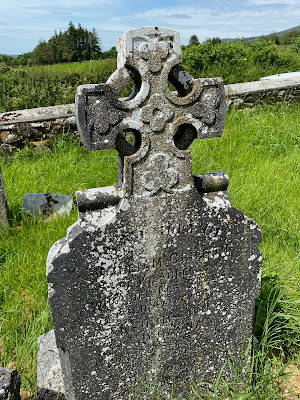 |
 |
Now that things are opening up here in Ireland and we can get on the road again, I am delighted to report that Dixie and I spent Monday afternoon out and about, searching for ruins and legends and encounters with nature.
While in lockdown, I made it a project to learn some songs in the Irish language. It’s a beautiful sounding language and a mournful ballad can make you cry even if you haven’t a clue what’s being sung.
One song I loved right away was the Caoine Cill Chaise (English: Lament to Kilcash). Probably written in the 18th century, it mourns the 17th century ruin of Kilcash Castle and its surrounding woodlands (historians say one greedy heir named Walter sold off the timber to finance his elaborate lifestyle, but the deforestation has come to symbolize the decline of the Gaelic way of life around that time).
The ballad also grieves the death of the mistress of Kilcash, Margaret Magennis (or Butler), Viscountess Iveagh. Apparently she was very much beloved for her kindness and generosity and made the castle a refuge for Gaelic poets and Catholic priests clashing with unneighborly British Protestants (very possibly my Methodist ancestors!).
Here is the first stanza of the ballad/poem in English:
“Now what will we do for timber,
with the last of the woods laid low?
There's no talk of Kilcash or its household
and its bell will be struck no more.
That dwelling where lived the good lady
most honored and joyous of women.
Earls made their way over wave there
and the sweet mass once was said”.
I have learned that this song is a favorite of Irish school children, and Dixie’s brother Paul, a retired teacher, graciously agreed to sing it at a music session with me as a duet. To my delightful surprise, others joined in, having learned it at school years ago. Paul also casually pointed out that Kilcash is just down the road from here about 30 miles or so.
What? Kilcash is just down the road? Why didn't I know this? So this week off Dixie and I went to find Kilcash Castle and the ruins of the medieval church next door to it, where many of the household, including dear Margaret, are buried.
It was easy to find on the side of the road just before KiIcash village near Clonmel. We stopped first at the church. Like many church ruins of the period (10th-12th century) all that was left were four stone walls enclosing a few random graves that hopefully appeared after services were discontinued. A carved Romanesque doorway was gorgeous and you could tell it had been really spectacular in its day.
In a mausoleum to the east rattled the ghosts of Lady Margaret and other leading ladies and gents from so many old stories long forgotten. These graves of the Butler/Ormonde family date back to 1691.
On the south side of the buildings, among patches of wildflowers and high grasses, standing gravestones stoically bore witness to the cast of characters in supporting roles round the castle. As always, lichens and erosion made the epitaphs hard to read, but we made out the dates on several to the 1700s. The Caoine Cill Chaise kept meandering through my thoughts and I found myself humming along with the bees, who I’m sure were singing the words in Bee Irish.
After a while of looking at the stones, taking pictures, looking at the same ones again, taking the same pictures again, we strolled over to the castle. It’s pretty crumbly so it’s gated off and you can only view it from a distance. But I just loved staring at it and imagining the hustle and bustle of life there 400 years ago. No wonder time travel books/movies are so popular, right?
We left the church and drove over to the present church in Kilcash for a quick look at the stained glass windows then made our way a kilometer or so to our second destination of the day… the trail head of Sliabh na mBan, the Mountain of the Women. I’ll write about that lore and adventure next time.





